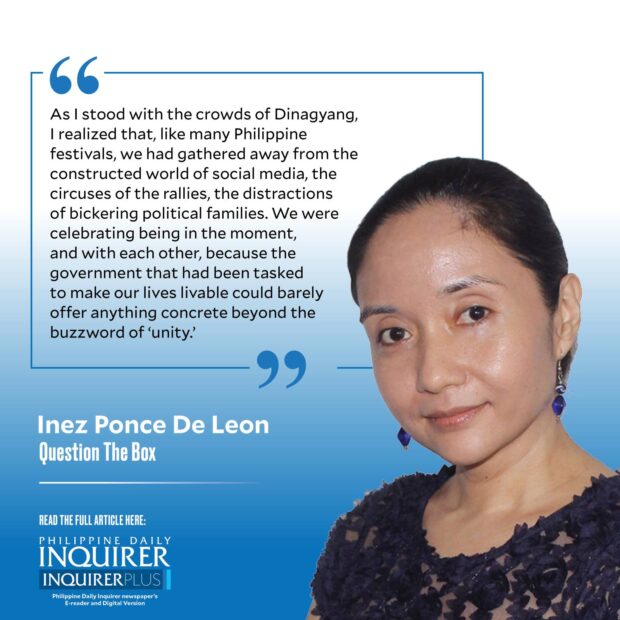Empty rallies, joyful festivals

Last weekend seemed to be all about rallies.
While those of a certain political persuasion might frown upon the implications of participating in large-scale demonstrations, the ability to speak about the ills of society and the license to demand change are consequential to democracy.
On the surface, rallies are a way for people to reinforce what Émile Durkheim calls social solidarity: a need to be a part of something greater, a connection that strengthens social ties which, hopefully, leads to people working toward a greater good.
Article continues after this advertisementToday’s rallies are vastly different from Durkheim’s time, however, with the spread of social media, greater access to information and education, and governments that can’t stop making the same mistakes. Research shows that people aren’t just angry enough to protest; they also join out of sympathy, or, thanks to social media, pride that they were able to carry their protest offline.
Jacquelien van Stekelenburg, writing for the London School of Economics, claims that protests happen because people compare their lives to an ideal. Richard Norman of openDemocracy, on the other hand, believes that people join rallies because they realize that they are not alone, and have seen past protests changing policy and resulting in wins in the short- and long-term.
What good can a protest do? Research into protests dating back to the 1970s shows that protests can change the political agenda, which is more likely for large, disruptive demonstrations. Protests also tend to be successful in a progressive democratic environment, where political parties work actively on policies and mobilize support based on the strength of these policies, where such parties are open to challenges and debates, and where there is support from allies in government.
Article continues after this advertisementLast week, the online world saw memos from different government agencies ordering their provincial offices to join the rally to launch the “Bagong Pilipinas” brand of governance, which would take place on a Sunday afternoon at the Quirino Grandstand.
It was called a kickoff, labeled a rally, and it raised eyebrows. It seemed to be a government services fair which people still had to sign up for online. According to a Vera Files investigation, it cost taxpayers millions of pesos in rentals and purchases for a new brand of leadership as opaque as the event itself. It was pushing for collective action through new governing principles, the press releases claimed; but on that Sunday, the stage was filled with different government agencies promising the same things they had already been mandated to do to begin with.
Bagong Pilipinas was inevitably compared to “Bagong Lipunan,” the rosy-colored, poetically written government program of the first Marcos regime that promised to end poverty, hunger, corruption, mass deception, and violence—and, in 21 years, did exactly the opposite.
Farther south, in Davao, the former president led a prayer rally, or vigil, or—something. Whatever it was, it turned into a rant-fest, as the former president and his allies called the new president names, accused him of new sins, and reminded him of his debts. There were barbs traded, over the next few hours, of who was influenced by which kinds of drugs.
Both rallies were simply crowds of words, with hardly any meaning and action to show. They felt so far away as I sat and wrote this column in Iloilo City, at the end of the Dinagyang Festival.
People from all over the world came to witness the street parties, the lights parade, the performances by dancers of all makes and genres. There were Sinulog-inspired dances with giant twirling skirts, LED-bejeweled headdresses that looked like illuminated butterfly wings, giant crowds that cheered and laughed together.
Sociology has always studied gatherings, and there are many external prompts that push people to attend such events. In the case of the Manila and Davao rallies, there had to be memos promising rewards. In the case of the Dinagyang, people braved traffic and hours-long flights to get to Iloilo—no orders given, no emotions toyed with.
We didn’t have a government suddenly promising an afternoon of centralized public services, when it could have used the funds to facilitate more efficient procedures in more offices on any other day. We didn’t have a governance mission forced down our throats, especially when it’s the government’s job to do the right thing anyway, without having to issue memos, without expecting applause.
We had real, actual joy.
As I stood with the crowds of Dinagyang, I realized that, like many Philippine festivals, we had gathered away from the constructed world of social media, the circuses of the rallies, the distractions of bickering political families. We were celebrating being in the moment, and with each other, because the government that had been tasked to make our lives livable could barely offer anything concrete beyond the buzzword of “unity.”
The festival was no escape. The joy was real. The election promises were not.
iponcedeleon@ateneo.edu
















